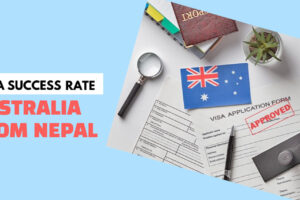Study Abroad From Nepal: Pro Tips For Students

Unlock success abroad with expert insights! Discover essential pro tips for Nepali students aspiring to study abroad. Your journey begins here:
If you want to have a life-changing experience as a student, then you should study abroad. It not only expands your network but also broadens your view about life and how the mechanism of other societies and cultures work.
When students study in a different country than theirs, their fixed cultures, ways of life, and thinking processes change. Unfortunately, many students don’t see why they should embark on such journeys. One of the major reasons for this deficit is the lack of knowledge.
If you’re in this category as a Nepalese student, not to worry! This guide has everything you need to know about studying abroad from Nepal.
Related reading; How To Get An Education Loan In Nepal for Studying Abroad

Why Study Abroad From Nepal?
As mentioned earlier, one of the best experiences any student can have is to study abroad. It allows students to explore other ways of thinking and improve the quality of their own experiences.
Now, you may be wondering, “why should students study abroad from Nepal?”
The main aim of students studying in first-world countries is to allow them to explore possibilities and see how they can effect change in their local communities when they return. Although Nepal is regarded as the 49th largest country in the world (by population), its economic growth and development have been disturbed at the edges by political unrest and discords.
Nepal thrives mainly on agriculture, and this sector employs over 60% of the population, mainly the youth, but more can be done. Social and economic infrastructure development has made snail progress.
Imagine how much the Nepalese economy will turn around if a good number of students have access to amazing study abroad programs, learn how first-world countries operate their economies, and return to improve their local communities and industries.
Some of the reasons include but not limited to poor technological infrastructure, nominal or no research support, uncertainty in exams, on-campus political activities, limited areas of study, and employers’ preference to hire foreign graduates.
Similarly, prospects to work/earn money and to obtain permanent residency (which are not easy as they hear) are also major reasons.
Based on the public reports (as of May 02, 2020), Australia has been the top preferred country Nepal with a student population of 46,011. After Australia, the main destinations for students are Japan, Cyprus, India, China, Canada, United States, New Zealand, South Korea, and the UAE.
Also read; Top Study Abroad Destination for Nepalese students

Pro Tips for Studying Abroad From Nepal
Even small details can go a long way in terms of helping you adjust to the environment in a new country mile apart from your home and loved ones. As an international student, you can come across situations when you might feel only if you knew this or that.
Nepalese students wanting to study abroad is not a new thing but very few feel prepared to cope up with the changes they need to face.
Let’s have a look at a few tips for Nepalese students wanting to study abroad:
Also read; What to keep in mind while choosing a university for studying abroad?
Learning the Language
Language is the best means of expressing yourself. If you are applying to a country where the first language is not English, you start struggling from day 1. English could be spoken in the country but not by everyone.
At times we take things for granted, for example, if you are applying to study Master’s program in Norway the language of teaching is English but the fact is you only spend few hours in the classroom and language could be a barrier while working, traveling, shopping and many more.
Knowing the culture
Culture, as we know, differs from one country to another but we generally tend to ignore that it might differ from one part of the country to another.
It is always good to be studying and knowing about the local culture once you are sure of studying in that particular locality.
You can do so by visiting the official webpage of the particular city, by talking to other international students and by taking help from the international admissions team in your university/college.
Also read; 7 Mistakes to Avoid While Applying for Studying Abroad
Food habit
When we think of a foreign country we generally think of burgers, pizza, pasta, and so on but this is not the case. Do make sure that you know what the food is like in the country you are planning to study.
We are used to ‘rice’ and ‘dal’ for almost every meal and things could be different if you are living on campus. Make sure you carry your favorite snacks from your home country to have something to eat until you get used to the local food. This is one of the basic tips for Nepalese students to help them manage their food habits.
Community
The university you are headed to could be located in urban, sub-urban or rural setting and you need to adapt accordingly.
For example, if you are going to a major city like New York, you will not need to worry about how to travel but if you are planning on studying in a university in Arkansas, you will need a vehicle of your own even if you want to go out to buy groceries.
There are public vehicles operating but only at an interval of 30 minutes or an hour and you definitely won’t enjoy waiting at a bus stop under freezing conditions for about an hour in the winter.
Financial Planning
The biggest problem that Nepalese students face is related to finance and this is obvious because of the fact that US $1 is equal to more than NPR 120.
What Nepalese students believe is they will be able to find a job which will be enough to pay for their tuition and living which unfortunately is NOT true.
Let’s look at an example, Cost of attending an average university in the USA is about $25,000 and the amount an International student can make by working throughout the entire year legally is $12,900 (20 hours a week *4weeks per month* 9 month of an Academic year + 40 hours a week *4 weeks per month * 3 months of summer when a student can work full time) assuming the hourly rate of payment is of $10.
Don’t just assume that things are going to be alright but instead make sure you have a proper plan on how you will be paying for your studies.
Make sure your parents are willing to support you not just for the first semester of first-year but throughout the duration of your studies.
Look at studying abroad as an investment not an expenditure. You would definitely won’t enjoy being in a situation of “I could have been successful if I had planned well financially”. Education advisors and consultants can provide good financial tips for Nepalese students.

Knowing your University
you might think you know your university by going through the website or the brochure you have received while receiving your offer letter but you might be wrong. Knowing your university means a lot more than knowing where it is and what programs they offer.
Do you know where the library is? How can you go to the cafeteria? You might need to meet a professor but do you know where his office is? Do you know what student organizations you can join in the university?
Do you know that you can find a job from here in Nepal if you apply early? Lots of questions that could arise if you really dig deep. The correct answer is in the proper research and communication.
Host Family
There may be families who are eager to host international students until they find a place to live in. Talking to your university regarding connecting you with a host family will not just make it easy for you to settle down but will also help you get familiar with the local culture and people.
They could be your family away from home and could be your place to visit during the holidays. If you are planning on studying abroad, make sure you find a host family.
Communication
Communication is key regardless of the country you are going to. Nepalese students have a habit of being shy and feeling inferior, but this is exactly what you should not be doing. Try to make as many friends as possible before you even land in the University.
How? Ask your university to connect you with the other students not just from Nepal but globally who have been studying or are planning to study with you.
Talk to them and try know them better, they could be your future room mates and having friends before reaching the university definitely helps.
Knowing Professors
Professors are your best friends; they don’t just teach you in the class they can help you with jobs in your related field, help you with your research and could be the best people to take advise from.
More importantly, they are the ones writing your recommendations for your future jobs or further education and they have very strong connection in the industry which can help you land good internships.
These could eventually lead you towards finding a full-time job and settling down in the country.
Weather
The rule of thumb in Nepal is to buy a North Face jacket if you are going to study abroad. Well, that may be needed but not always and may be you need more than just 1 of such jackets if you are going to a place which is extremely cold such as some parts of Canada but do you really need one if you are going to Florida for your further studies?
Some places may see too much rain, for example, London, so knowing the weather is very important. You don’t want to end up switching your university or country after reaching there because you don’t like the weather.
Shopping:
Departing students tend to do a lot of shopping and more often they buy stuffs that they will never use or use very few times.
It is always good to take the stuff that you already own and if needed then buy it in the country you are traveling to, you don’t want to end up buying something that you will feel awkward using. Instead, take some extra cash for shopping.
Learn to be independent
Most Nepalese students are dependent on their parents for most of their household things and trying to learn how to do things that you will need to be doing by yourself once you reach your preferred destination is always going to make life easier for you. Most common problems are cooking, cleaning, doing dishes, laundry and so on.
Country Comparison
Most Nepalese students decide where they want to study simply based on where their friends and relatives are. However, there is a lot more that you need to be knowing before deciding upon which country you should be headed to.
Dreaming of Studying Abroad? Take the First Step with a FREE Consultation!
Make sure to compare countries
Duration of Study. Generally, England has 3 years Bachelors but USA 4 years.
Post-study Work Permit: UK has 2 years PSW whereas Canada has 3 years. Similarly, Australia has up to 4 years PSW and USA has up to 3 years in the form of OPT depending on nature of their majors.
Generally, UK/Australia/Canada requires a student to send the tuition fees before applying for a VISA but USA doesn’t
An international student can work only on-campus for 20 hours a week but while studying in Australia you can work for 40 hours fortnightly and can do so either on-campus or off-campus.
Most US-based Universities offer different types of scholarships and up to full scholarships but this can not be true in most of the other countries.
Related reading; Abroad Study Scholarships (UK)
US Universities can ask for standardized test scores like SAT, GRE, GMAT, or ACT but these tests may not be needed in other countries.
In countries like UK/Australia/Canada you can apply for a pathway program and its common for a lot of Nepalese students but this is not so common if you are considering applying to the universities in the USA.
A student will need to face an interview at the Consular Section if he/she is planning to study in USA but you may or may not have to face an interview to study in Canada, Australia and other countries.
You will have to wait for a certain time to receive your student visa in other countries but the decision is made right after your visa interview and you will know it right away at the US Consulate.
Taking help from experts
As the saying goes, “Morning shows the day”, planning is very important if you want to succeed as an international student and it starts from knowing what country would be the best for you, what major you should study, which university you should go to, etc.
One might argue that everything is available online; however, getting help from someone who has been in the field for long can help you go the extra mile.
We generally take advise from our relatives who are living in your country of interest, but have we asked ourselves how many universities they know about and how many applications they have successfully filled? How many SoPs have they reviewed?
Related reading; Statement of Purpose (SoP) for Study Abroad
Every University is different and there are many programs that you might have never heard of before and there could also be changes in different immigration policies and your case could be completely different from the case of your friend, relative or whoever you know in the country of your preference.
Why do you take risks if someone can genuinely help you? If you have made up your mind to study abroad, before you do anything else like visiting an educational consultancy or asking your friends and relatives living in the country of your interest, check the following websites for authentic information about the country of your interest so as to avoid being misled:
🟦 For USA: https://educationusa.state.gov
🟦 For UK: https://study-uk.britishcouncil.org
🟦 For Canada: https://Canada.ca
🟦 For Australia: https://www.studyinaustralia.gov.au/
Also read; What to pack for study abroad?
Please complete this form to talk to an Advisor at Edwise Foundation. You can ask any questions relating to the application process, universities, majors, costs, funding (scholarship, TA/RA), F-1 interview, etc. Please note that we can work with any universities for you as long as you fit in well in respect to your academic interests and financial capacity.
What are the top destinations for Nepalese students
Countries all over the world have educational systems that welcome international students. However, it’s not enough to go to any country to study. You have to choose a country that welcomes people of diverse cultures, backgrounds, and experience, and whose educational systems have stood the test of time.
From proper research, countries with the best educational environment and international student reception are The United States, New Zealand, Canada, Thailand, Mexico, Switzerland, Spain, and a host of others.
But the best to study is the United States of America.
Why is this so?
You would agree that the US is the most culturally diverse country in the world, one that accepts people regardless of race, gender, social status, or religious beliefs. The US educational system has strong STEM and liberal arts programs that anyone can benefit from.
Plus, they have several specialized support and services to ensure that international students are given fair treatments in all universities and colleges. This is something that a lot of countries don’t offer.
Is the US the best choice for study abroad?
What you should be asking is, “if not the US, what country should be the alternative?”
The US boasts of a well-grounded educational system that’s receptive to international students. First of all, there is no other country that boasts of a diverse student population like the US. It allows students to interact with people from other cultures and backgrounds, and expand their worldview.
Secondly, most US colleges encourage full campus student experiences. They encourage student participation in co-curricular activities, and sometimes, even award credits. This boosts student creativity and interaction.
Furthermore, the US educational system encourages so much academic flexibility. There is flexibility in choosing your major, and they give time to explore so many interests before settling for one.
Now that you understand why the US is the best choice for study abroad, you may have several questions or need guidance to start the process from Nepal. This is why you should reach out to a good study abroad consultancy.
Which is the best consultancy in Nepal for abroad studies?
If you want to have a stress-free study abroad program, you should only go for the best consultancy.
The best and most reliable one is Edwise Foundation. The Edwise Foundation is a student placement agency based in Nepal that is committed to ensuring that Nepalese students have quality access to US education.
We collaborate with hundreds of universities and colleges in the US and other countries like UK, Australia, and Canada to help students choose, depending on their interests and financial capacity.
UK
Study Abroad from NepalThe UK is regarded as one of the best study destinations for students across the globe. Every year the United Kingdom attracts thousands of international students to participate in the world-class study programs.
Uk is leading in education with some of the top universities and colleges like Oxford University, University of Cambridge, Imperial College London, UCL, and London School of Economics and political science and some others.
Back in 2009 lots of Nepalese students regretted choosing the UK as the study destination because most of the colleges they applied for were closed down for some reason. You need to make sure you only apply to universities that are well recognized by the government and considered as legit higher learning institutions.
Australia
With a wide range of study opportunities for international students, Australia has become the leading destination for Nepalese students looking to study abroad. Australia offers around 1200 institutions and 22,000 courses.
The act 2000 from Australian GGoverment act controls and look after the international student in Australia
Canada
Study Abroad from NepalOne of the most demanded degree in the international market is the Canadian degree. Canadian colleges and universities are reputed for providing the highest quality of education that is highly sought after in the international market.
Education is highly practical and research-based. At least 60% and 2.8 plus GPA is something you should look for in order to make entry to the Canadian education system. The requirement highly depends on the institution and program you are looking for. meeting the academic requirement is very essential before starting the application process for getting successful placement in Canadian universities.
USA
The USA is the most preferred study abroad destination for most of the students. Around 5%of the total students enrolled in higher education in the USA are from international destinations.
What is the language requirement for Canada
Language tests like IELTS or TOEFL or PTE are mandatory for Nepalese student applying for study abroad in Canada
What about Post-Graduate Work Permit Program in Canada
If you have been a student in Canada for more than 8 months or have been studying for more than 900 hours, you are considered eligible for PGWPP.
Based on the length of your study program, you are issued a work permit for valid from 8 months to 36 months.
Are there any scholarships available in Australian universities for Nepalese students?
There are different scholarships offered to Nepalese and other international students by the Australian Government and education institutions.
You can learn more about Australian scholarships by clicking the link: https://www.edwisefoundation.com/scholarship-for-international-students-in-australia/
Are there any short course in Canada for students from Nepal?
Students from Nepal can take advantage of the short courses offered in Canada which are job-oriented and involve more practical learning and training.
Associate degree, Diploma, and Certificate are some of the short courses popular in Canada. You can learn more about the short courses in can Canada by visiting the link: https://www.edwisefoundation.com/what-are-the-short-courses-in-canada-for-internatinal-students/
What are the Benefits of Studying Abroad
Study abroad offers a lot of unique opportunities. You will experience a brand-new country with incredible new outlooks, customs, and activities, natural wonders, etc. You can choose to do a major that may not be available in Nepal.
You will also be exposed to new cultures, which would be a great asset when you graduate and return home. You will also have a chance to immerse yourself in a new language. You can also make lifelong friends abroad as most of the quality universities abroad have students from different parts of the world.
Another important reason for you to study abroad is to prepare yourself for an exciting career. In this globalized world, employers prefer foreign graduates, and employers in Nepal can’t be an exception to this.
An important thing for you to consider before you plan to study abroad in which country you best fit in. You can take a look at it from different perspectives- financial, academic, career goal, etc. You need to talk to a professional consultant/advisor who can give you a comparative analysis.
Edwise Foundation houses consultants who have studied and worked abroad, and are in a position to guide you right from ‘country selection’ to ‘post-visa’.
Let’s list out the top benefit of studying abroad for Nepalese students.
Explore new perspective and cultures
Studying abroad is the best way to explore new perspectives and cultures. Most times, our culture and environment affect the way we react to certain issues and events, which may not be healthy in the long run.
By studying abroad, you get to meet people from different countries, share their unique experiences, and understand their thinking patterns.
Increases your social network
Students that study abroad build valuable and precious relationships with people from around the world. They not only increase their international connections and network, but they also meet people who may become lifelong friends or business partners.
These friends could introduce them to internships, mentorships, and lots of career opportunities.
Learn different teaching styles
As explained earlier, your environment and immediate conditions could influence how you think and react to people or situations. The way you’ve been taught may influence how you learn new things.
By studying abroad, you learn different teaching styles that can help you to easily adapt to different managerial styles and be versatile when you enter the workforce.
Confidence development
If you can successfully live and thrive in a culture that’s different from yours, you will certainly develop skills that will lead to personal growth, such as adaptability, independence, and self-reliance.
The challenges you’ll experience may overwhelm you at first, but it will also give you the confidence you need to try out newer paths.
Still, have doubts? I doubt.
Now that you know the benefits of studying abroad, let’s look at the cost of studying abroad and what the cost covers.
Ready?
Cost of Studying Abroad From Nepal
No one can actually put an average price tag when it comes to studying abroad, because the price depends on a lot of factors, including extreme costs for advanced programs and countries. There is no common ground for what the average price tag should be.
However, statistics show that the price hovers around $36,000 per year globally. Some countries have colleges that cost as low as $10,000.
What do these costs cover? Tuition, housing, food, transportation, and on-ground support systems for little emergencies. If you feel you’ll get overwhelmed with study abroad preparations or you don’t know where to start from, the best thing to do is reach out to a study abroad consultant.
Now, the question is, “Which one?”
We will find out in a bit, but first, what are the top destinations for students to study abroad?



